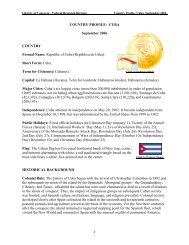1 - American Memory
1 - American Memory
1 - American Memory
You also want an ePaper? Increase the reach of your titles
YUMPU automatically turns print PDFs into web optimized ePapers that Google loves.
27<br />
days, more than 23,000 workers were unemployed, a rate of 6.3 percent.<br />
By February 1972 when the strike had resumed, the rate of imem-<br />
ployment had risen to 6.5 percent. Tliis was the first time since 1956<br />
that Hawaii's unemployment rate exceeded the national average. Even<br />
these alarming figures do not tell the whole story—that many people<br />
were forced to work a reduced workweek. They of course do not<br />
show up on the unemployment rolls, but their take-home pay was<br />
cut by as much as half—at a time when prices were steadily rising<br />
because of the strike.<br />
Indeed, the effects of shipping stoppages are felt not only by our<br />
businessmen, but by every person living in Hawaii. The consumer and<br />
food price index is compiled by the U.S. Department of Labor, Bureau<br />
of Labor Statistics, attest to the impact of these strikes on Hawaii's<br />
consumer prices. During the months of June through October 1971,<br />
Honolulu's food prices rose 4i/^ percent, while nationwide food prices<br />
were declining three-tenths of 1 percent during that same period due<br />
to the wage-price freeze which began in August. The average family in<br />
Hawaii was paying 72 cents for a head of lettuce and $2.28 for 10<br />
pounds of potatoes, more than twice the mainland cost for these and<br />
other staple food items.<br />
I cannot impress upon you strongly enough the importance which<br />
I attach to the problem. During the 100-plus day shipping stoppage I<br />
flew to San Francisco for talks with both sides in the dispute.<br />
I presented the plight of our people both to Harry Bridges of the<br />
ILWU and to Ed Flynn of the PAL\. Both tliese men admitted to me<br />
that the people of Hawaii were unfairly being held hostage in their<br />
dispute. Both agreed that less than a dozen ships would suffice to pro-<br />
vide the minimum needs of Hawaii and keep our State from facing<br />
economic disaster. Less than a dozen ships, gentlemen, and a tieup of<br />
west coast docks will normally idle as many as 200 vessels in west coast<br />
ports.<br />
I think Mr. Flynn summed up the attitude of both sides in the dis-<br />
pute fairly succinctly. He shrugged his shoulders and he said "It's just<br />
one of those things." Well, gentlemen, as mayor of the city and coimty<br />
of Honolulu, in which resides 83 percent of the entire population of<br />
the State of Hawaii, that is not a good enough answer for me or the<br />
people I serve. Our people are entitled to protection from these stop-<br />
pages, and if it is humanly possible for me to do so, I aim to see that<br />
they get it.<br />
In conclusion, gentlemen, I ask as others have done, to use your<br />
imagination for a moment. Visualize an impeneti'able wall built<br />
around the city of Washington. No surface transportation entering<br />
or leaving the area, no cars, no buses, no trucks, no trains, no ships.<br />
Your only contact with the rest of the United States would be via air<br />
from the west coast.<br />
If this happened to the city of Washington, how long would it take<br />
Congress to act ? I am certain it would not take long. Not the years<br />
and years that Hawaii has waited. A general surface transportation<br />
strike would be unthinkable for a mainland city. Yet when Hawaii's<br />
shipping is cut off; that is exactly what happens here.<br />
I say to you very bluntly, gentlemen, that when one of the 50 sover-<br />
eign States of this I^nion can find itself isolated, virtually cut off from<br />
the rest of the world as was the city of Berlin in 1948, and the Govern-



![Albert Einstein Papers [finding aid]. Library of Congress. [PDF ...](https://img.yumpu.com/21604228/1/190x245/albert-einstein-papers-finding-aid-library-of-congress-pdf-.jpg?quality=85)





![American Colony in Jerusalem Collection [finding aid]. Library of ...](https://img.yumpu.com/17941275/1/190x245/american-colony-in-jerusalem-collection-finding-aid-library-of-.jpg?quality=85)



![Piccard Family Papers [finding aid]. - American Memory - Library of ...](https://img.yumpu.com/17941234/1/190x245/piccard-family-papers-finding-aid-american-memory-library-of-.jpg?quality=85)


